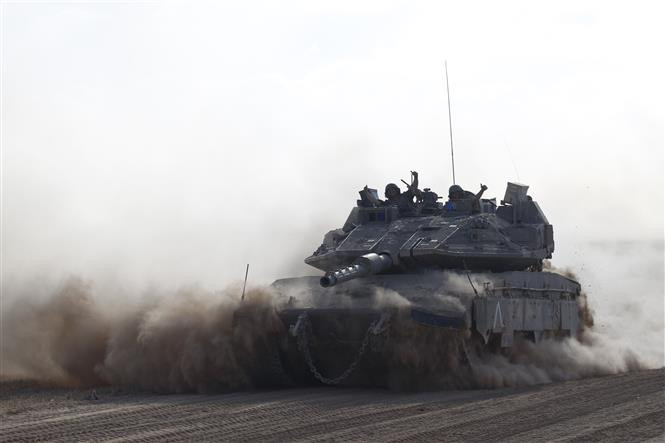Israel's quiet recalibration of its Rafah battle plan helped it avoid overstepping President Biden's warning.

US and Israeli officials said Tel Aviv adjusted its military operations in Rafah after in-depth discussions with US officials to avoid crossing the red lines of the Joe Biden administration and causing a crisis in relations with its closest ally, according to the Wall Street Journal.
Israel has scrapped initial plans for a large-scale assault with two divisions pouring into Rafah, an operation the White House feared would lead to high casualties in a conflict that has already seen a spike in civilian deaths.
Instead, Israel opted for a military campaign focused on sealing the border between Gaza and Egypt as well as limited attacks on Rafah.
Israel’s quiet recalibration of its battle plan has helped it avoid overstepping President Biden’s warning that Tel Aviv should avoid a major ground operation in Rafah or risk losing US military support.
The warning comes as President Biden seeks to put more pressure on Hamas and Israel to agree to a ceasefire as part of a three-phase roadmap to end fighting in the Gaza Strip.
However, the scaled-back Israeli military operation still took a toll on civilians in Rafah, with US and other Western officials complaining that there was insufficient preparation to ensure the evacuation of more than 800,000 civilians from Rafah during the fighting.
Meanwhile, new tensions have flared between Israel and Egypt, which has been reluctant to open the Rafah border crossing while Gaza is under attack by the Israeli army.
Israel’s efforts to use smaller munitions in its airstrikes have highlighted the difficulty of carrying out operations in densely populated areas. An Israeli airstrike using bombs containing only about 17 kilograms of explosives still killed several civilians, according to Palestinian officials. Israel said two senior Hamas leaders were killed and suggested the civilian deaths may have been caused by an explosion from a Hamas ammunition depot. The incident remains under investigation.
The uncertain diplomacy to secure a ceasefire suggests the debate over America’s red line — a term first used by President Biden in March — is likely to resurface in the coming weeks.
“There has been a misunderstanding of what President Biden’s red line statement meant,” said Jonathan Panikoff, a former senior US intelligence officer and now a fellow at the Atlantic Council think tank. “For many in the Arab world, it was understood to mean that a military operation in Rafah was prohibited if Israel wanted to maintain US support. But for many in the US administration, Washington never meant that Israel could not conduct a military operation, but rather that Israel could not conduct an operation like the one in Gaza City or Khan Younis that resulted in high death tolls and destruction.”
The notion of an ultimatum from the US president on the scope of Israeli military operations in Gaza became a focus of public debate when an MSNBC interviewer asked Biden on March 9 whether an Israeli “Rafah offensive” would cross the president’s “red line” with Israeli Prime Minister Benjamin Netanyahu.
For many US officials, the phrase “red line” conjures up the idea of a hard ultimatum and has an unhappy history. In 2012, President Barack Obama said that Syria’s use of chemical weapons would be a “red line for the United States.” He was later criticized for refusing to use military force to intervene after more than 1,400 people were killed in a chemical weapons attack.
Behind closed doors, Israel’s plan to attack Rafah was discussed extensively within the Strategic Consultative Group, a group of senior US and Israeli officials who regularly confer online and in person. “They didn’t use a ‘red line,’ they just said let’s do it differently to minimize civilian casualties. That’s how they talked,” said one Israeli official.
As Israel developed its strategy, the idea of deploying two divisions to attack Rafah, a densely populated city of more than a million people, was put aside. Another plan was drawn up to control the Rafah crossing from Egypt to Israel and a strip along Gaza’s border with Egypt that Israel said was riddled with tunnels used by Hamas to bring in weapons, construction materials and other supplies.
“It is not that we are just adjusting our plans to please the US without achieving our goals. We are not giving up on the goal of defeating Hamas in Rafah,” the Israeli official continued.
US officials said they expected the Israeli plan to include raids on Rafah to search for Hamas members and hostages, rather than a massive ground offensive. The White House also confirmed it was monitoring Israeli activities.
“We will not support a major ground operation in Rafah,” said John Kirby, a spokesman for the US National Security Council. “A major ground operation requires many units, tens of thousands of troops, moving in a series of coordinated actions against multiple targets on the ground in a massive manner. We have not seen them (the Israeli military) do that.”